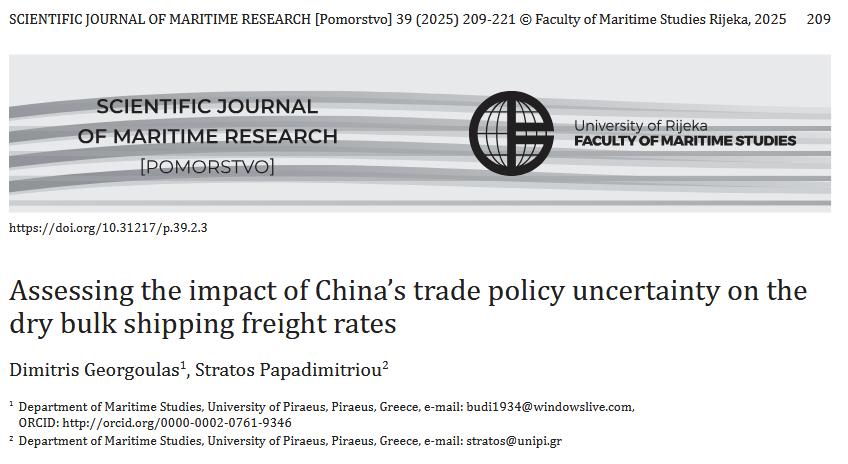Assessing the impact of China's trade policy uncertainty on the dry bulk shipping freight rates
Keywords:
BDI, China, TPU, ANN, Out-of-sample forecast performance, Trade Policy Uncertainty, dry bulk market, Artificial Neural NetworksAbstract
The impetus for our research lies in the multifaceted and pivotal role of China in the dry bulk market, encompassing its positions as a leading global exporter, a dominant shipbuilder, and a major shipowner. However, the effects of uncertainty arising from trade policy and particularly Chinese trade policy (CTPU) on the dynamics of the dry bulk market have remained unexplored by empirical studies. This study addresses this gap by analyzing the impact of CTPU on the Baltic Dry Index (BDI),
a key indicator of international trade and the global economy.
Performing the Granger causality test and the impulse response function, we demonstrate a decline in sea-transportation demand and cost in the dry bulk market due to a spike in CTPU, yielding results consistent with option theory. This effect is observed across all BDI sub-indices and lasts approximately one year, by the end of which the markets fully recover. By developing artificial neural networks, we effectively avoid in-sample bias and underscore the out-of-sample predictability of
CTPU on BDI, establishing it as a key determinant of the latter.
Based on our findings, we propose strategies for various maritime stakeholders and supply chain managers to maximize profitability and enhance operational efficiency in transportation.

Downloads
Published
Issue
Section
Categories
License
Copyright (c) 2025 DIMITRIS Georgoulas, Stratos Papadimitriou

This work is licensed under a Creative Commons Attribution-NonCommercial-NoDerivatives 4.0 International License.
Scientific Journal of Maritime Research understands the need for authors to disseminate and maximize the impact of their research. When submitting an article for publishing in Scientific Journal of Maritime Research, it implies that the Corresponding Author transfers, with the consent of all Coauthors, the copyright ownership in the referenced submission, including all versions in any format now known or hereafter developed, to the Scientific Journal of Maritime Research.
Copyright protects your original work and research material and prevents others from using it without your permission. Others will be required to credit you and your work properly, thus increasing its impact. Should your submission be rejected or withdrawn prior to acceptance for publication by Scientific Journal of Maritime Research, this transfer will be null and void.
Authors, users or readers of an article need clear instructions on how they can use the article. Scientific Journal of Maritime Research uses the Creative Commons Attribution-NonCommercial-NoDerivatives (CC-BY-NC-ND) 4.0 International License, which governs the use, publishing and distribution of articles by authors, publishers and the wider general public.
The authors are allowed to post a digital file of the published article, or the link to the published article (Scientific Journal of Maritime Research web page) may be made publicly available on websites or repositories, such as the Author’s personal website, preprint servers, university networks or primary employer’s institutional websites, third party institutional or subject-based repositories, and conference websites that feature presentations by the Author(s) based on the published article, under the condition that the article is posted in its unaltered Scientific Journal of Maritime Research form, exclusively for non-commercial purposes.




